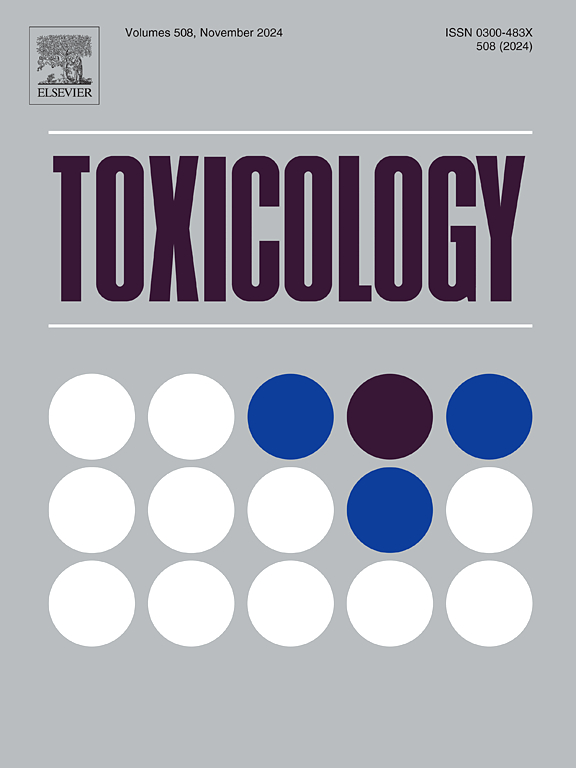T-2毒素通过破坏红细胞的承诺和分化诱导贫血。
IF 4.8
3区 医学
Q1 PHARMACOLOGY & PHARMACY
引用次数: 0
摘要
T-2毒素是镰刀菌产生的一种稳定的高毒性次生代谢物,具有很强的细胞毒性,可威胁多个系统。然而,其对造血系统的影响和诱导贫血的机制尚不清楚。在此,我们建立了浓度为0.5 ~ 4mg/kg的急性T-2毒素中毒小鼠模型。我们的研究结果表明,T-2毒素暴露会导致小鼠严重贫血,红细胞计数和血红蛋白水平显著降低。进一步的分析表明,T-2毒素会严重破坏造血干细胞的稳态及其对红系谱系和随后的红系分化的承诺,从而显著抑制红母细胞和网织细胞的形成。在人类中,细胞暴露于浓度为0.25至1ng/mL的T-2毒素13天。T-2毒素强烈抑制红细胞生成,促进异常有核红细胞的形成。从机制上讲,高浓度的T-2毒素诱导细胞凋亡,而低浓度的T-2毒素使细胞周期停留在G1/S期。总之,我们的研究结果揭示了T-2毒素的血毒作用,揭示了T-2毒素诱导贫血的机制,为制定减轻T-2毒素中毒的策略提供了有价值的指导。本文章由计算机程序翻译,如有差异,请以英文原文为准。
T-2 toxin induces anemia via disrupting erythroid commitment and differentiation
T-2 toxin, a stable and highly toxic secondary metabolite produced by Fusarium, is known to have strong cytotoxicity and threaten multiple systems. However, its effect on the hematopoietic system and the mechanisms of anemia induction remains unclear. Here, we establish the acute T-2 toxin poisoning mouse model at concentrations ranging between 0.5 and 4 mg/kg. Our results show that T-2 toxin exposure causes severe anemia in mice, as indicated by significant reductions in red blood cell count and hemoglobin levels. Further analysis indicates that T-2 toxin profoundly disrupts the homeostasis of hematopoietic stem cells and their commitment to the erythroid lineage and subsequent erythroid differentiation, thus significantly inhibiting the formation of erythroblasts and reticulocytes. In humans, cells are exposed to T-2 toxin at concentrations of 0.25–1 ng/mL for 13 days. T-2 toxin strongly inhibits erythropoiesis and promotes the formation of abnormal nucleated erythroblasts. Mechanistically, high concentration of T-2 toxin induces apoptosis, while lower levels arrest the cell cycle at the G1/S phase. Overall, our findings reveal the hematotoxic effects of T-2 toxin and shed light on the mechanisms underlying T-2 toxin induced anemia, providing valuable guidance for developing strategies to mitigate T-2 toxin poisoning.
求助全文
通过发布文献求助,成功后即可免费获取论文全文。
去求助
来源期刊

Toxicology
医学-毒理学
CiteScore
7.80
自引率
4.40%
发文量
222
审稿时长
23 days
期刊介绍:
Toxicology is an international, peer-reviewed journal that publishes only the highest quality original scientific research and critical reviews describing hypothesis-based investigations into mechanisms of toxicity associated with exposures to xenobiotic chemicals, particularly as it relates to human health. In this respect "mechanisms" is defined on both the macro (e.g. physiological, biological, kinetic, species, sex, etc.) and molecular (genomic, transcriptomic, metabolic, etc.) scale. Emphasis is placed on findings that identify novel hazards and that can be extrapolated to exposures and mechanisms that are relevant to estimating human risk. Toxicology also publishes brief communications, personal commentaries and opinion articles, as well as concise expert reviews on contemporary topics. All research and review articles published in Toxicology are subject to rigorous peer review. Authors are asked to contact the Editor-in-Chief prior to submitting review articles or commentaries for consideration for publication in Toxicology.
 求助内容:
求助内容: 应助结果提醒方式:
应助结果提醒方式:


